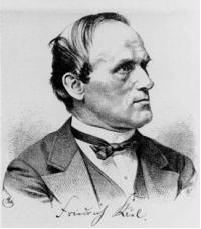Presents
Friedrich Kiel
|
|
 |
Soundbites courtesy of Steve Jones |
New Waltzes for String Quartet, Op.78
Kiel's Op.78 New Waltzes for String Quartet were composed as the result of an earlier set he wrote in 1872, his Op.73. The original set were not intended as salon music but actual concert pieces. Critics called them the finest set of waltzes for string quartet and they subsequently became tremendously popular. This popularity led his publisher to demand a second set which Kiel composed in 1879 and which were published as his "New Waltzes" the following year. These waltzes are equally as fine and also enjoyed great popularity up until the First World War.
Writing of the chamber music of Friedrich Kiel (1821-1885), Wilhelm Altmann—perhaps the greatest of chamber music critics—wrote that Kiel“...produced a number of chamber works, which...need fear no comparison.” Altmann, himself, said that he found in Kiel’s chamber music a “never ending source of delight.” Kiel was taught the rudiments of music and received his first piano lessons from his father but was in large part self-taught. Something of a prodigy, he played the piano almost without instruction at the age of six, and by his thirteenth year he had composed much music. Kiel eventually came to the attention of Prince Wittgenstein, a great music lover. Through the Prince's efforts, Kiel was allowed to study violin with the concertmaster of the Prince’s fine orchestra with which he later performed as a soloist. Kiel was also given theory lessons from the renowned flautist Kaspar Kummer. By 1840, the eighteen year old Kiel was court conductor and the music teacher to the prince’s children. Two years later, Spohr heard him and arranged for a scholarship which allowed Kiel to study in Berlin with the renowned theorist and teacher Siefried Dehn. In Berlin, Kiel eventually became sought after as an instructor. In 1866, he received a teaching position at the prestigious Stern Conservatory, where he taught composition and was elevated to a professorship three years later. In 1870 he joined the faculty of the newly founded Hochschule für Musik which was shortly thereafter considered one of the finest music schools in Germany. Among his many students were Noskowski, Paderewski and Stanford.
Like his first set, these New Waltzes are not lightweight, salon music but meant for the concert hall, deserving the attention of professionals and amateurs alike. Our soundbite presents a little less than half the work.
Parts: $24.95
Parts & Score: $31.95